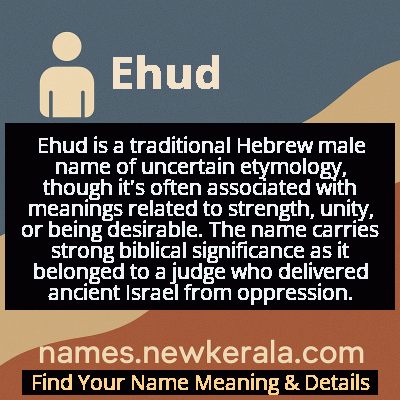Ehud Name Meaning & Details
Origin, Popularity, Numerology Analysis & Name Meaning of Ehud
Discover the origin, meaning, and cultural significance of the name EHUD. Delve into its historical roots and explore the lasting impact it has had on communities and traditions.
Name
Ehud
Gender
Male
Origin
Hebrew
Lucky Number
2
Meaning of the Name - Ehud
Ehud is a traditional Hebrew male name of uncertain etymology, though it's often associated with meanings related to strength, unity, or being desirable. The name carries strong biblical significance as it belonged to a judge who delivered ancient Israel from oppression.
Ehud - Complete Numerology Analysis
Your Numerology Number
Based on Pythagorean Numerology System
Ruling Planet
Moon
Positive Nature
Diplomatic, friendly, artistic, empathetic.
Negative Traits
Over-sensitive, moody, indecisive, prone to self-pity.
Lucky Colours
Green, cream, white.
Lucky Days
Monday.
Lucky Stones
Pearl, moonstone.
Harmony Numbers
1, 3, 4.
Best Suited Professions
Diplomats, mediators, caregivers, artists.
What People Like About You
Cooperative spirit, friendliness, artistic talent.
Famous People Named Ehud
Ehud ben‑Gera
Biblical Judge
Delivered Israel from Moabite oppression through strategic assassination and military leadership
Ehud Barak
Politician/Military Leader
Former Prime Minister of Israel, Chief of General Staff, and recipient of the Medal of Distinguished Service
Ehud Olmert
Politician
12th Prime Minister of Israel who initiated significant economic reforms and peace negotiations
Ehud Manor
Songwriter/Poet
One of Israel's most celebrated lyricists, wrote over 1,000 songs and received the Israel Prize
Name Variations & International Equivalents
Click on blue names to explore their detailed meanings. Gray names with will be available soon.
Cultural & Historical Significance
In modern Israel, the name gained renewed prominence through prominent political figures like Ehud Barak and Ehud Olmert, connecting contemporary leadership with ancient biblical heritage. The name embodies the Zionist ideal of strong, capable leadership while maintaining deep roots in Jewish tradition and history. It represents the continuity of Jewish sovereignty from ancient times to the modern state, making it particularly meaningful in Israeli national consciousness.
Extended Personality Analysis
Individuals named Ehud are often perceived as strong-willed, strategic thinkers with natural leadership qualities. They tend to be decisive and action-oriented, capable of making difficult choices under pressure while maintaining a clear vision of their objectives. The biblical narrative suggests traits of courage, ingenuity, and the ability to turn perceived weaknesses into strategic advantages, much like the left-handedness that became Ehud's tactical edge.
Modern bearers of the name often exhibit political acumen, diplomatic skills, and a strong sense of national or community responsibility. They typically combine traditional values with progressive thinking, showing adaptability while remaining grounded in their principles. Their leadership style often balances assertiveness with calculated risk-taking, making them effective in positions requiring both vision and practical execution. The name carries expectations of intelligence, reliability, and the capacity to handle complex challenges with innovative solutions.
Modern Usage & Popularity
Ehud remains a distinctly Israeli name with moderate usage, primarily within Jewish communities and particularly in Israel. While not among the most popular names, it maintains steady usage due to its strong biblical roots and association with modern political leaders. The name saw increased popularity during Ehud Barak's political prominence in the 1990s and early 2000s, reflecting how contemporary figures can revitalize traditional names. It's considered a traditional yet modern choice that conveys strength and Jewish identity, often selected by parents who value both historical significance and contemporary relevance. Outside Israel, the name is rare but occasionally used by Jewish families seeking to honor their heritage, particularly those with Israeli connections or strong Zionist affiliations.
Symbolic & Spiritual Meanings
Symbolically, Ehud represents the triumph of intelligence over brute strength and the power of unexpected advantages. The left-handedness of the biblical Ehud transforms from potential weakness to strategic asset, symbolizing how perceived limitations can become sources of strength and innovation. The name embodies the concept of deliverance and liberation, representing the ability to overcome oppression through clever strategy rather than conventional means. It also symbolizes the connection between ancient tradition and modern statehood, bridging biblical history with contemporary leadership while maintaining the enduring values of courage, wisdom, and national responsibility. The name carries connotations of resilience, tactical thinking, and the courage to take decisive action when circumstances demand it.

